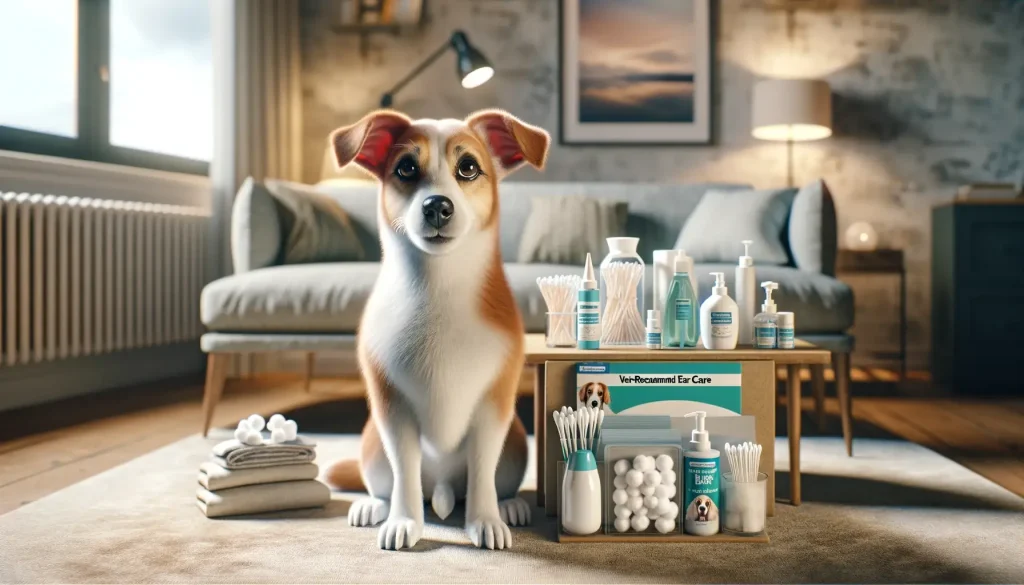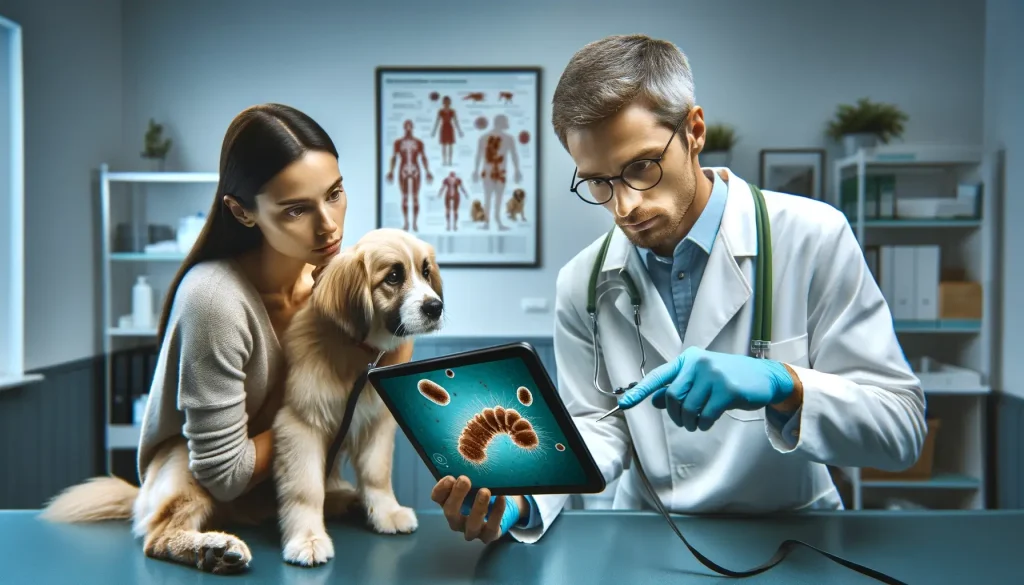
Early Signs of Giardia in Dogs
Giardia in dogs is more common than you might think. This parasite, which triggers the condition known as giardiasis, lurks in places your dog loves, from the soil in your backyard to the water in public parks. When a dog comes into contact with giardia cysts, usually through contaminated soil, water, or feces, the adventure may end in an unpleasant way. Recognizing the signs of giardia is crucial because it is highly contagious among dogs, especially in communal settings like dog parks or kennels. While the primary symptom is often watery diarrhea, its presence isn’t always obvious, especially in dogs that carry the parasite without showing signs.
- Giardia is a common parasitic infection affecting dogs, particularly in contaminated environments.
- It is very contagious, easily spreading in places where dogs gather or share water and food dishes.
- Symptoms range from digestive issues like watery diarrhea, sometimes with blood, to more severe health concerns in puppies and older dogs.
- Treatment involves medication, with metronidazole being a common prescription.
- Although giardiasis is usually not fatal, it poses a significant discomfort and risk, particularly to puppies and senior dogs.
- Humans can also contract giardia from dogs, making it a zoonotic concern that requires good hygiene practices.
Catching giardia early can significantly reduce its impact on your dog’s health and prevent its spread to other pets and even humans. How can you tell if your dog has giardia, and what steps should you take next?
Facts and Care for Giardia in Dogs
Giardia in dogs is a topic every pet owner should be familiar with. This parasite, responsible for giardiasis, can significantly affect your dog’s health and your peace of mind. By knowing the essential facts and how to care for a dog infected with giardia, you can keep your furry friend healthy and happy.
At its core, giardia is a microscopic parasite that thrives in contaminated environments. Dogs can easily contract giardia by coming into contact with infected feces—a common occurrence in places they love to explore. Given its highly contagious nature, it’s vital to understand the risks and symptoms associated with this infection.
- Giardia is a parasite that causes giardiasis, a condition picked up from contaminated sources.
- It’s notoriously contagious among dogs, especially in communal areas.
- Symptoms include digestive issues like watery diarrhea, sometimes with blood.
- Treatment typically involves antibiotic medication, with metronidazole being common.
- While usually not fatal, giardiasis can severely impact young puppies and older dogs.
- Humans can also contract giardia from dogs, posing a zoonotic risk.
Being aware of these key points can help you swiftly identify and address giardia in your dog. It’s not just about keeping your dog safe; it’s also about preventing the spread to other pets and humans. With the right knowledge and action, you can ensure your dog overcomes giardia with minimal discomfort.
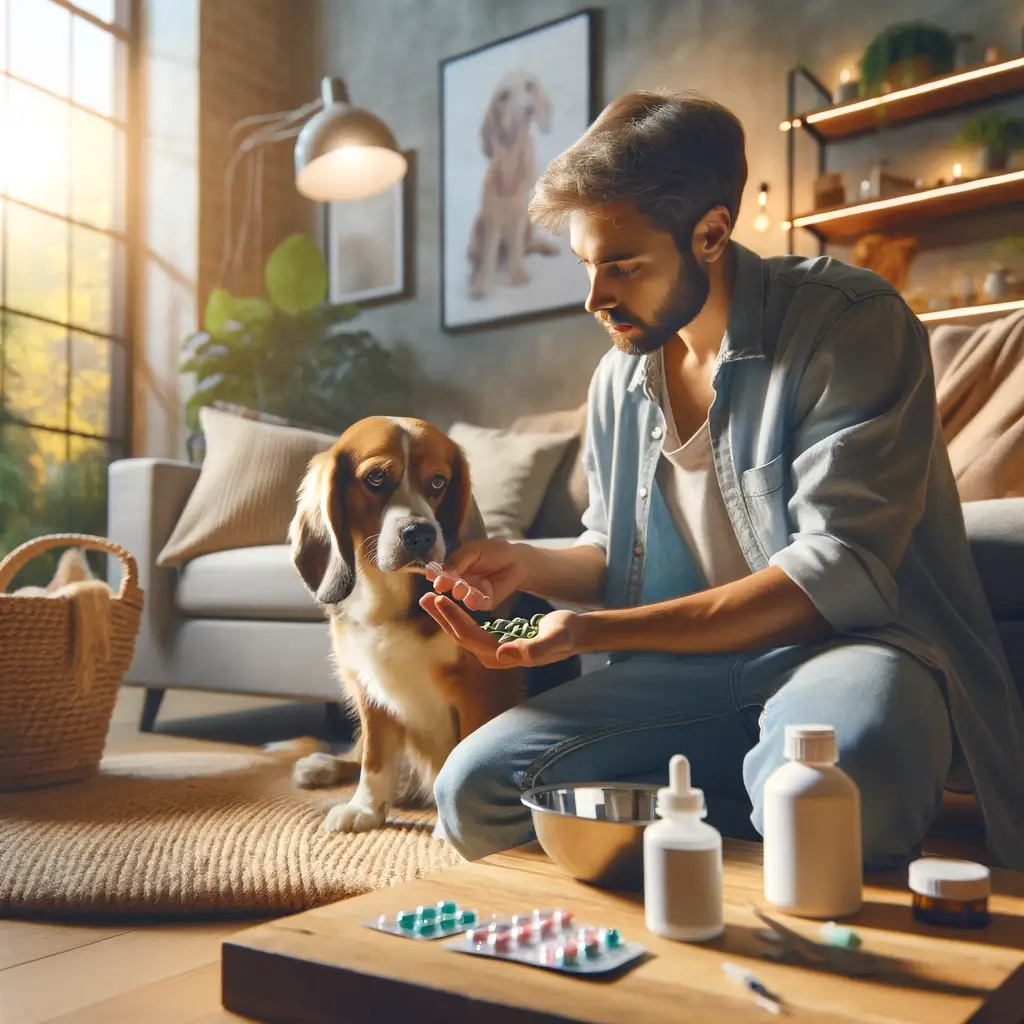
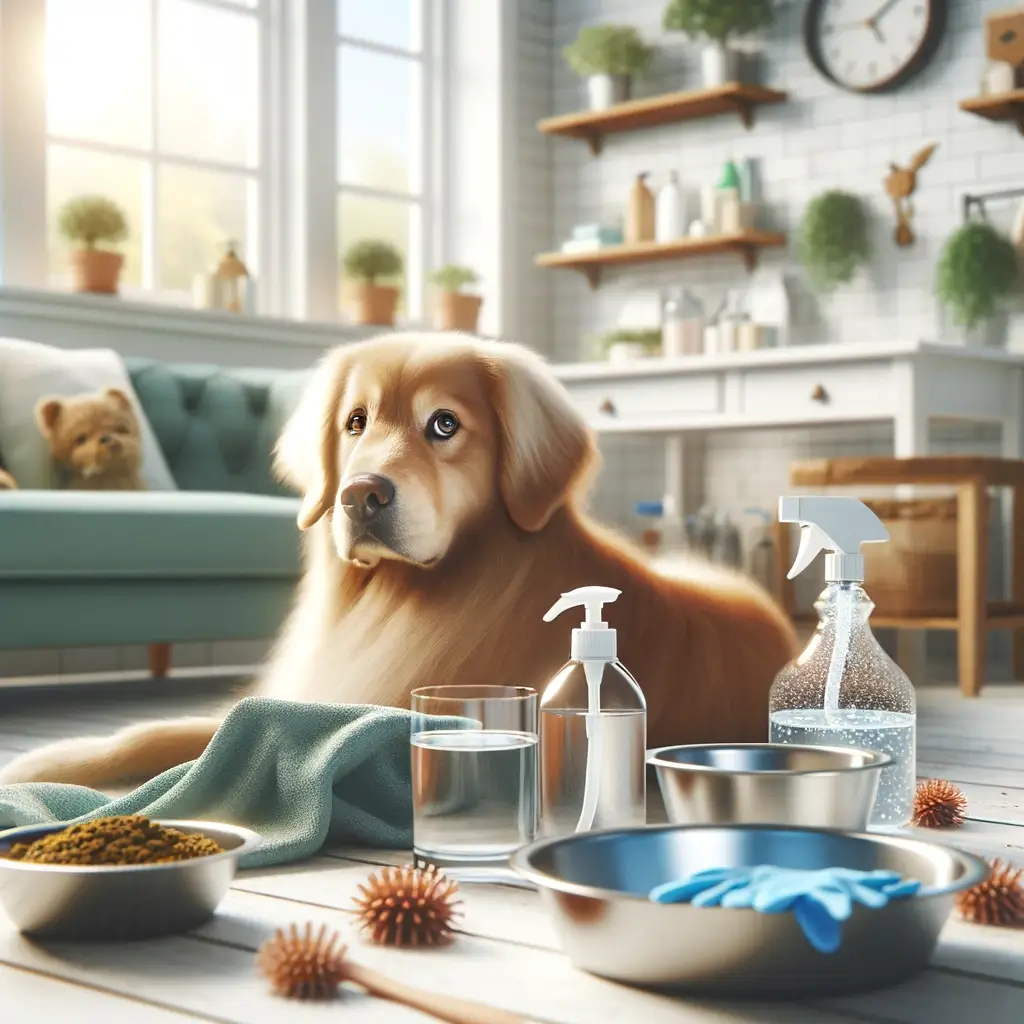
Home Care for Dogs with Giardia
Dealing with a giardia infection in your dog requires attention and care both from a vet and at home. Here are home care strategies to help your dog recover from giardia and prevent its spread.
- Cleanliness is Key: Regularly clean your home, especially areas where your dog spends a lot of time. Use a bleach-water solution to disinfect surfaces, as giardia cysts are highly resilient.
- Water Matters: Provide fresh, clean water to your dog at all times to prevent dehydration. Avoid areas with stagnant or unclean water where giardia thrives.
- Personal Hygiene: Wash your hands thoroughly after handling your dog or cleaning up its feces. Wear gloves if necessary to minimize the risk of transmission.
- Poop Disposal: Dispose of your dog’s feces immediately and safely. Giardia cysts can infect other animals and even humans if left unchecked.
- Isolate If Needed: If you have multiple pets, consider isolating the infected dog to prevent the spread of giardia to other animals in the house.
- Follow Vet Instructions: Administer all medications as prescribed by your veterinarian. Completing the full course of treatment is crucial for recovery.
Giardia in dogs is a manageable condition with the right approach. Home care plays an essential role in your dog’s recovery and in preventing the spread of the disease. By maintaining a clean environment, practicing good hygiene, and following your vet’s advice, you can help your dog overcome giardia. Remember, staying vigilant and proactive is the best defense against this common parasite.
When to Visit the Vet
Knowing when to seek professional care for your dog is essential in managing giardia effectively. While home care strategies play a crucial role in managing symptoms and preventing the spread of giardia, recognizing the signs that warrant a vet visit is key to your dog’s health.
Giardia can be tricky due to its highly contagious nature and the variety of symptoms it presents. Immediate vet consultation is recommended when you notice any of the following in your dog:
- Persistent watery diarrhea: While occasional digestive upset is not uncommon, ongoing symptoms should not be ignored.
- Blood in stool: This is a sign that giardiasis may be affecting your dog’s gastrointestinal health more seriously.
- Lethargy and dehydration: If your dog is less active than usual and shows signs of dehydration, it’s time for a vet visit.
- Signs of weight loss or poor condition, despite a normal diet: This could indicate that giardiasis is impacting your dog’s ability to absorb nutrients.
During the vet visit, expect diagnostic tests such as fecal exams to confirm the presence of giardia. Your vet will discuss treatment options, including medication like metronidazole, and advise on home care and hygiene practices to support recovery and prevent reinfection.
Preventive measures, such as regular cleaning and avoiding areas known for contamination, can reduce the risk of giardia. However, if your dog is experiencing symptoms or you suspect exposure to giardia, don’t delay in seeking professional care. Early intervention is the best way to ensure a swift recovery and minimize discomfort for your furry friend.
Remember, giardiasis might not be fatal, but it can cause significant discomfort and potential health risks, especially to puppies and senior dogs. Since humans can also contract giardia from dogs, prompt treatment is crucial for the health of your pet and your family.
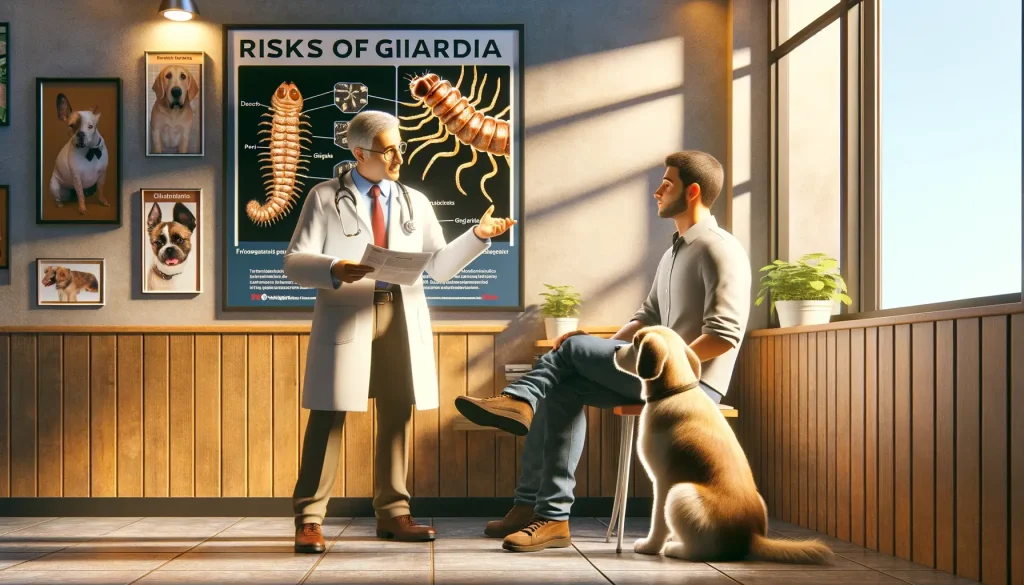
Key Points About Giardia in Dogs
As a pet owner, it’s important to be aware of giardia, a common issue many dogs face. Here are six critical facts to help you understand giardia and how it may affect your furry friend.
- Understanding Giardia as a Parasite: Giardia is more than just a nuisance; it’s a parasite that causes giardiasis in dogs. This infection spreads when your dog interacts with giardia cysts found in infected animals’ feces, often lurking in contaminated soil, water, or fecal matter.
- The Highly Contagious Nature of Giardia: This parasite doesn’t play favorites; it’s highly contagious among dogs. Shared spaces like dog parks, kennels, and even your home can become hotspots for giardia transmission, making it essential to monitor your dog’s health and interactions closely.
- Recognizing the Symptoms: If your dog has giardia, the most obvious sign is usually watery diarrhea. The condition of the stool can vary, and sometimes, blood may be present. While some dogs might not show symptoms, young puppies are particularly vulnerable due to their developing immune systems.
- Treatment Is Necessary: Addressing giardia requires medical intervention. Veterinarians commonly prescribe metronidazole to tackle the infection. Alongside medication, maintaining cleanliness and proper hygiene in your dog’s environment is crucial to prevent the spread of giardia.
- Giardia’s Impact on Dogs: Generally, giardiasis is not life-threatening. However, it can make your dog feel unwell, leading to dehydration and lethargy, especially in very young or old dogs with weaker immune responses.
- Preventing Transmission to Humans: Giardia doesn’t just affect dogs; it can also pose a risk to humans. Implementing strict hygiene practices when handling an infected dog is critical to prevent human infection.
Being informed about giardia is the first step in protecting your dog and family from its impact. Recognizing the symptoms early on, understanding the importance of treatment, and maintaining a clean environment can help manage this parasite effectively. Always consult with your veterinarian if you suspect your dog has contracted giardia or if you have concerns about its health.
Beginner Guide to Raising Quail at Home
What are the Signs of a Dog Concussion?
What Causes Your Dog’s Ears to Smell Bad?
When your dog’s ears start to emit an unpleasant odor, it might leave you puzzled…
Methimazole Treatment for Cat Hyperthyroidism
Methimazole plays a crucial role in managing feline hyperthyroidism, a condition marked by an overactive…
Got Hummingbirds in your Backyard? Here’s How to Care for Them.
Why Does Your Cat Pee Outside the Litter Box?
Cat’s Litter Box Issues It’s not uncommon for cat owners to face the frustrating dilemma…


